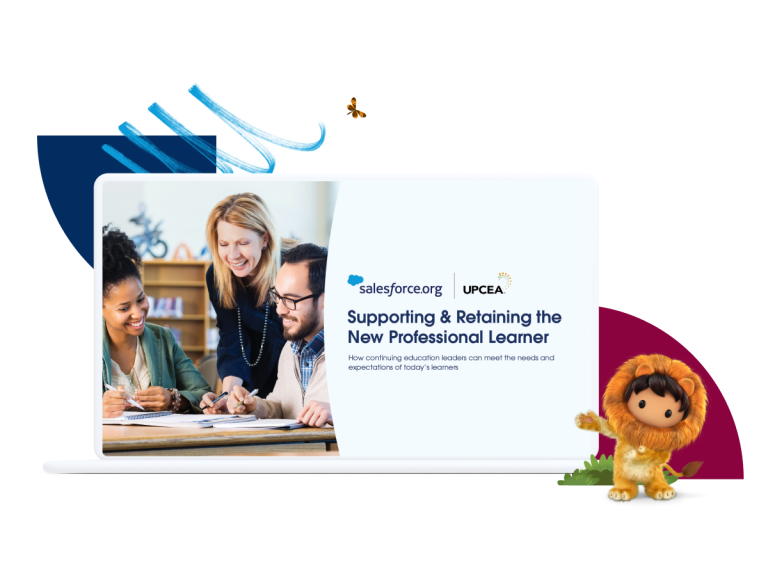Why is it Important to be able to Pivot to New Business Models Quickly?
Whether higher education institutions are expanding their hybrid learning options or launching an executive education program, having a flexible platform is key in order to activate new business models and partnerships. Colleges and universities need to be able to quickly support constituent needs as they change over time. The right technology platform can make the difference between long term success and challenges for learners, faculty, and staff as they adapt to an evolving educational landscape.
Strengthen Corporate Partnerships
In today’s fast-paced world, institutions increasingly rely on relationships with corporate partners to strengthen pathways from education to career. The second edition of the Connected Student Report revealed that 49% of prospective students say career possibilities are a main factor shaping their enrollment decisions. It’s no surprise, then, that close to half (48%) of global institutions are strengthening corporate partnerships to better prepare their students for digital careers. Corporate partnerships enable colleges and universities to reach more students, offer more relevant programs, and close the loop between learners, skills and jobs.
The University of Buffalo, for example, has more than 500 corporate stakeholders, but needed an easy way to manage those relationships in order to boost engagement, create better experiences, and ultimately drive more value. The Business and Entrepreneurship (BEP) team was challenged with data collection and management, lacking cohesive and actionable information about their partners and how the university as a whole was interacting with them on an individual basis.
By implementing a CRM platform, BEP was able to capture not only contact names and market segments, but also partner conversations and items typically found outside of higher education, such as net promoter scores. BEP was able to manage its information efficiently and effectively, and increase visibility across the organization to achieve a better understanding of their partners’ needs and perspectives.
“It’s our responsibility to make sure we have the right data to be able to do outreach and engagement that’s targeted, authentic, and that really makes our partners feel taken care of,” said Tracy Krawczyk-Schiedel, Director of Marketing and Communications, Business and Entrepreneur Partnerships.
Support Hybrid Learning Environments
Hybrid learning has also increased over the last two years. This is a model in which students spend 50% or more of their time learning online and the remainder in physical classrooms. These courses are clearly here to stay, and their growth has triggered students and staff to seek more flexibility in how they learn and work. In fact, when asked about the resources they need to be successful, 26% of students said more flexible courses and part-time offerings.
Nearly half of institutions (45%) are implementing new business models because of the pandemic, with the most popular models centered on part-time learning options (48%) and short-term courses and programs (46%).
Foster Learner Relationships for Life
Reskilling and upskilling the global economy has been one of the most remarkable shifts to happen in education during the past few years. When 76% of the workforce feels unprepared for the future of work (which the Global Digital Skills Index from Salesforce recently revealed), institutions have an unprecedented opportunity to connect with alumni who can pick up new skills and grow their careers by coming back to the classroom.
With a flexible CRM platform, institutions have the ability to create new experiences for lifelong learners, building new revenue streams and ultimately growing their course offerings. Institutions across the globe are already leveraging a CRM platform to manage enrollment, program performance, and corporate partnerships all in one place. With seamless learning journeys and storefront experiences, colleges and universities can accelerate growth while supporting lifelong learners looking to expand their skill sets.

Support & Retain the New Professional Learner
Learn from over 500 continuing education students and 12 institutional leaders about how to better communicate with, support, and retain continuing education students.
How the University of Kentucky Reinvented Campus Operations
Being future-ready means having the agility to quickly support students, from anywhere. During the height of the pandemic, the University of Kentucky was determined to help their students in any way possible. While seeing students in person was no longer an option, the University of Kentucky built a call center to quickly check in on students. Although the call center was new to the institution, leadership was able to get it up and running quickly with the flexibility of an integrated CRM platform.
Because all their student data was in one place, the university did not have to wait on legacy systems to support their evolving needs during the pandemic. UK’s leaders created a task force involving more than 500 people spanning 19 workstreams.
Throughout, they maintained an intentional focus on outward communication. UK’s faculty, parents, and students were sent targeted “Uplift and Update” emails bi-weekly through Marketing Cloud intended to raise spirits, inform people of the latest developments, and to ensure a continued meaningful connection with their community.
With CRM for higher education, the University of Kentucky has a strong foundation for the future—with the insights, strategies, and tools in place to respond to whatever may come next. “I expect that our work here will help define the way we approach other issues and help other areas better adapt to this pandemic….we’re positioned to pivot quickly, to be increasingly agile and innovative, and emerge from this stronger than ever.” said University of Kentucky Chief Communication Officer Jay Blanton.
How the London School of Economics and Political Science Supported Students & Staff during the Pandemic
In London, UK, the London School of Economics and Political Science (LSE) needed to pivot quickly during the height of the pandemic. University leaders needed to ensure that queries from prospective students would be addressed promptly, and that students could continue taking their assessments from home during lockdowns.
LSE was able to support their applicants, students and staff in multiple ways using CRM for higher education. For the applicant community, LSE deployed Live Agent, a chat tool, as a new support channel for prospective students to connect and engage with the recruitment and admissions team and find answers in real-time. For existing students, new processes were built with Flow allowing them to defer assessments if they could not take them during the summer assessment period.
For their faculty, LSE built a Course Assessment Planner and a dashboard to track progress. Live Agent was also deployed for faculty to support them with answers to any queries as they were going through this new process. LSE standardized a process to roll out Live Agent rapidly to any service that required it across the institution.
All of the above was achieved within seven weeks while the LSE team adapted to working collaboratively from home.

“The teams are on fire, both the Salesforce team and the broader LSE team. Salesforce solutions are being delivered at an unbelievable pace and enabling business critical processes and services to support our students across the globe. The art of the possible is old news, this is realizing the impossible, with Salesforce.”
Mike Page, Head of Enterprise CRM & SRS, The London School of Economics and Political Sciences
How to Learn More
In this Future-Ready Playbook, we have discussed the definition and applications of CRM for higher education; how it helps colleges and universities improve the constituent experience and increase productivity; and how it enables institutions to be prepared for whatever is next. We’ve also presented some examples of schools activating new business models, the first pillar of the future-ready institution. In the following chapter, we’ll discuss how a CRM platform can foster a data-empowered culture in higher ed.
The Future-Ready Playbook
Learn more about CRM for higher education and dive into the four pillars of the future-ready institution. Each of the following chapters is dedicated to these pillars, with actionable steps you can take to drive learner and institution success from anywhere.

Learn More about Salesforce for Education
Dive into customer stories, success metrics, and tailored solutions for education.

